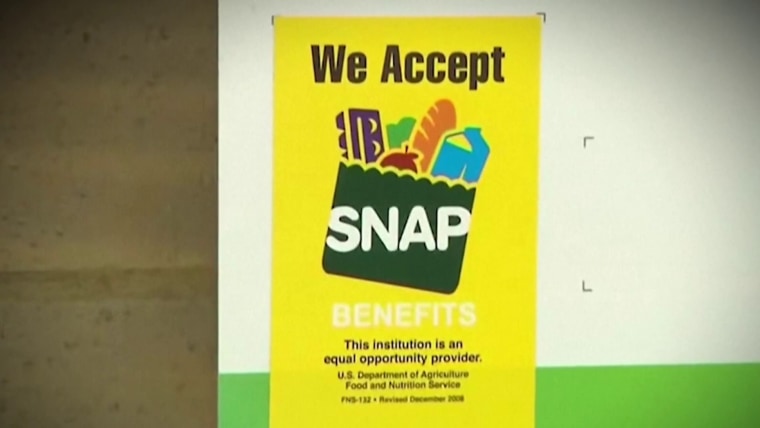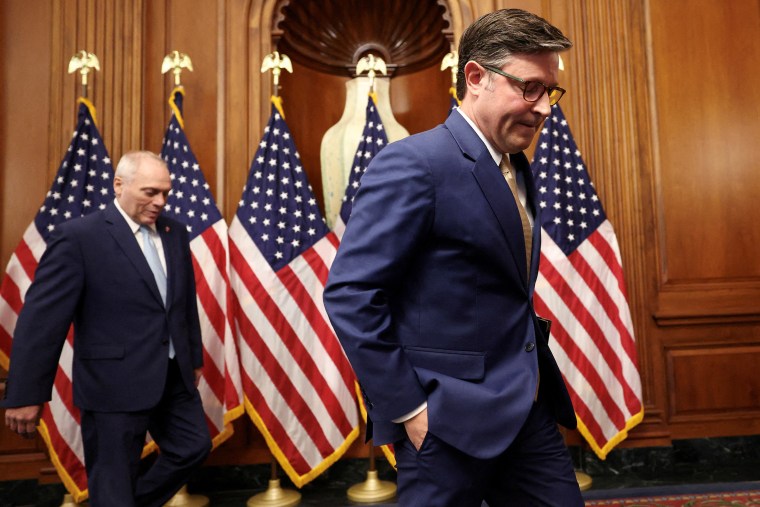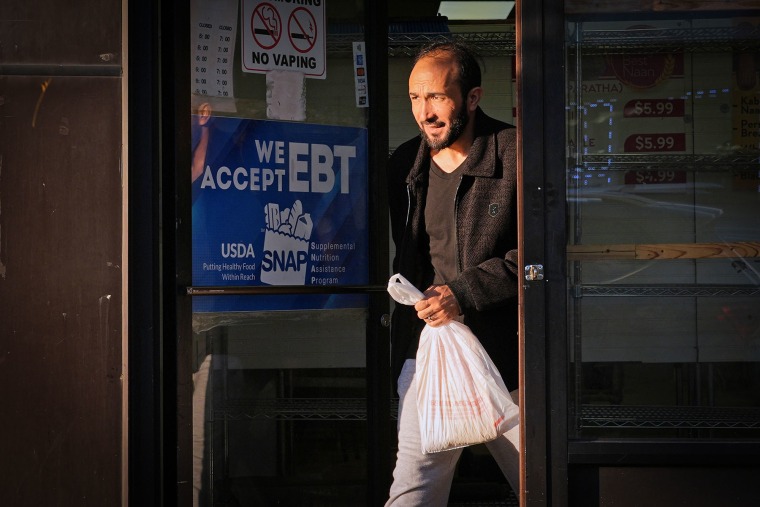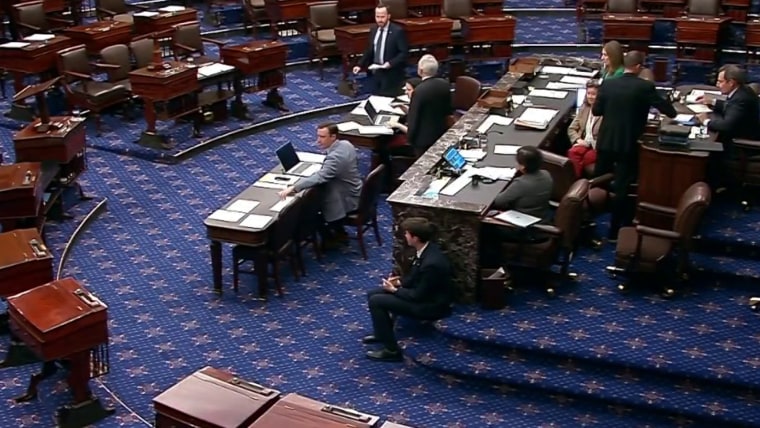WASHINGTON — The lengthy standoff between President Donald Trump and congressional Democratic leaders is now the longest government shutdown in American history.
On Wednesday, the shutdown enters its 36th day, eclipsing the record set during Trump's first term. That 35-day federal closure in late 2018 and early 2019 resulted from a fight over Trump’s demand for a border wall, which Democrats refused to fund.
It's a testament to the current political environment that some senators aren't even shocked.
"I wouldn't use the word surprised," Sen. John Kennedy, R-La., said. "It disappoints me."
Though Congress has not reached a deal, some senators indicated this week that progress was being made behind the scenes.
The painful impacts from the shutdown are now coming into clearer focus. Hundreds of thousands of civilian federal workers are not getting paid, forcing many to turn to local food banks to feed their families. Meanwhile, flight delays are growing worse around the country because of air traffic controller and TSA agent staffing shortages. And 42 million Americans who rely on federal food benefits through SNAP will receive only about half of their monthly benefit in November.

"The stories from this weekend were were shameful, sickening," Senate Minority Leader Chuck Schumer, D-N.Y., said in a floor speech Monday. "People overwhelming food banks, handing out groceries in lieu of Halloween candy, teachers paying out of pocket to give their students extra food. Across America, appalling scenes were seen of people worried they wouldn’t be able to feed their families and even themselves."
But party leaders on both sides of the aisle don't appear to be moving with any urgency as the shutdown nears the five-week mark. On Tuesday, Senate Majority Leader John Thune, R-S.D., held a vote on the same House-passed funding bill to reopen the government for a 14th time. Democrats, who are demanding that Trump negotiate with them over expiring health care tax credits before agreeing to open the government, voted down that bill yet again.
Many in Congress were looking to the results of Tuesday night's elections to give a sense of where the public stands.
"I think it’s pretty clear, and I think tomorrow's results may confirm this, that the American people want us to fight for them," Sen. Chris Murphy, D-Conn., said Monday.
Murphy, who had just returned from Miami, where he was speaking to voters about rising health care costs, continued: "Shutdowns hurt, but the pain that I just heard in Florida is gonna be worse than anything happening with the shutdown, because when those premiums go up by 100 to 200%, those people’s lives are ruined. People will die."
Tune in to live NBC News election night coverage:
- NBC News NOW, our free streaming service, will be airing an election special beginning at 7 p.m. ET.
- NBCNews.com and the NBC News app will feature real-time results of all the major races, as well as all the latest reporting.
- NBC News’ podcast, “Here’s the Scoop,” will be livestreaming on YouTube and NBCNews.com beginning around 11 p.m. ET.
- NBC News’ Chief Data Analyst Steve Kornacki will be at the big board all night, analyzing results and providing minute-by-minute updates exclusively on the NBC News NOW special and the “Here’s the Scoop” livestream.
Senators see progress
Still, there are green shoots of hope springing up in the Capitol. A small bipartisan group of senators is continuing to hold talks on how to break the impasse, including a meeting Monday after the lawmakers returned to Washington.
"Progress is being made," Sen. Gary Peters, D-Mich., said.
Sen. Susan Collins, R-Maine, the chair of the Appropriations Committee responsible for writing federal funding bills, concurred — without getting into details.
"I feel that we have made some progress," she told reporters. "Over the weekend, the staff has worked very hard. Members have worked very hard. I personally have talked to both House and Senate members about a path forward. Democrats are bringing their, their specific language, forward for the first time, and it just feels better this week. Now, who knows? It could all fall apart again, and I don't mean to imply there's an agreement."

Senate Minority Whip Dick Durbin, D-Ill., a veteran of several shutdown battles who is retiring after more than four decades in Congress, said he, too, feels a sense of optimism this shutdown could end soon.
"After you've been around here forever, as I have been, you kind of sense the ebb and flow of this place, and I sense that people are tired of this shutdown and all that flows from it. But we're still stuck with this premise of what we're going to do about health care costs."
We’d like to hear from you about how you’re experiencing the government shutdown, whether you’re a federal employee who can’t work right now, a person who relies on federal benefits like SNAP, or someone who is feeling the effects of other shuttered services in your everyday life. Please contact us at tips@nbcuni.com or reach out to us here.
Thune, who, along with House Speaker Mike Johnson, R-La., has been casting blame on stubborn Democrats for the prolonged shutdown, said Monday he believed the two sides are "getting close to an off ramp here."
He declined to get into specifics, but broadly pointed to bipartisan negotiations to pass fiscal 2026 appropriations bills, as well as his promise to give Democrats a vote on renewing the expiring Obamacare subsidies after they vote to open the government.
"This is unlike any other government shutdown in terms of the way Democrats [are] reacting to it," Thune said. "They've got to be willing to take yes for an answer."
Alleviating pain points
Part of the reason it's dragged on this long is that some of the most severe pain points seen during a typical shutdown have been alleviated — either by Trump himself or the courts.
Twice in recent weeks, the president has ordered Defense Secretary Pete Hegseth to find other ways to pay the troops, first by tapping a Pentagon research and development fund, then by using that R&D fund and other pots of money.
The administration also is setting aside $450 million in customs revenue to keep money flowing to a nutrition program for low-income women, infants and children, known as WIC.

With the government shuttered, the Trump administration said it would halt federal SNAP funding, the Supplemental Nutrition Assistance Program previously known as food stamps, starting Saturday, the first of the month.
But a federal judge ruled that the Agriculture Department must use emergency funds to keep SNAP benefits going, and on Monday, administration officials said they would send partial SNAP benefits to states for November. House Minority Leader Hakeem Jeffries, D-N.Y., slammed that as insufficient.
"It's extraordinary that Donald Trump, his administration and corrupt Republicans on Capitol Hill are voluntarily and intentionally withholding SNAP benefits from 42 million Americans who are at risk of going hungry," Jeffries told reporters.
GOP divisions over a new stopgap
Congress has already burned through most of the time allotted in the House-passed stopgap bill, which would have funded the government through Nov. 21. Lawmakers will need to extend that timeline, given the lack of progress on legislation to fund the government for the full fiscal year, which runs through September 2026.
Republicans are divided on how long the next short-term funding bill should last.
Collins told NBC News she prefers a deadline of Dec. 19, which would put pressure on Congress to reach an agreement before Christmas.
But multiple other Republicans rejected that idea.
“I don’t think we’ll end up doing December," said Kennedy, who also sits on the Appropriations Committee. "Senator Collins is certainly entitled to her opinion, and I understand her point of view. But I don’t think it’ll prevail.”
Sen. Rick Scott, R-Fla., backed a Jan. 15 deadline that would avoid a holiday dash to reach a deal and instead push the issue into 2026.
"I don't want another Christmas omnibus," Scott said. "That's what keep getting every year. The only way we make sure we don't get it is we get past, we get there, get to Jan. 15."



